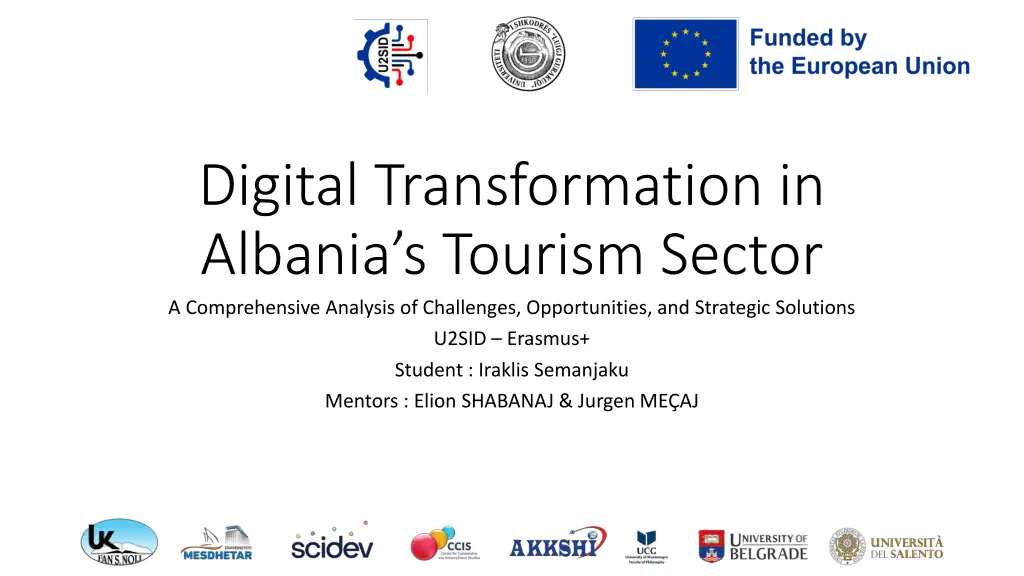
Albania Tourism Digital Transformation Analysis
Explore challenges and opportunities for digital transformation in Albania's tourism sector. Discover strategic solutions to enhance competitiveness and sustainability through innovative technologies and practices.
Download Presentation

Please find below an Image/Link to download the presentation.
The content on the website is provided AS IS for your information and personal use only. It may not be sold, licensed, or shared on other websites without obtaining consent from the author. If you encounter any issues during the download, it is possible that the publisher has removed the file from their server.
You are allowed to download the files provided on this website for personal or commercial use, subject to the condition that they are used lawfully. All files are the property of their respective owners.
The content on the website is provided AS IS for your information and personal use only. It may not be sold, licensed, or shared on other websites without obtaining consent from the author.
E N D
Presentation Transcript
Digital Transformation in Albania s Tourism Sector A Comprehensive Analysis of Challenges, Opportunities, and Strategic Solutions U2SID Erasmus+ Student : Iraklis Semanjaku Mentors : Elion SHABANAJ & Jurgen ME AJ
Content 1. Introduction & Context 2. Methodology 3. Analysis of the Current State 4. Opportunities for Digital Transformation 5. Strategic Framework 6. Policy Implications & Recommendations 7. Case Studies 8. Conclusions
Introduction Albania s tourism sector is a key driver of economic growth. The industry faces challenges in digital adoption and innovation. This report explores solutions to transform the sector via digital tools and strategies.
Context of Tourism in Albania Albania's cultural heritage and strategic location boost tourism. Tourism contributes significantly to GDP and employment. COVID-19 exposed vulnerabilities, highlighting the need for digital transformation. According to World Bank data, in 2024, the tourism sector is expected to contribute significantly to Albania's economic growth, with a projected growth of 3.3%
Importance of Digital Transformation Digital transformation in the tourism sector is not just a trend but an urgent need to remain competitive It involves integrating digital technologies into all aspects of the tourism business, from marketing and sales to customer service and internal operations. For Albania, this transformation presents a unique opportunity to overcome infrastructural gaps and position itself as an innovative and technology-friendly destination.
Study Objectives 1. in adopting digital technologies? 2. How can digital transformation improve service quality, operational efficiency, and market competitiveness in the Albanian tourism sector? 3. What are the most effective strategies for implementing a successful digital transformation in the Albanian tourism industry? 4. How can digitalization contribute to the sustainable development of tourism and the preservation of Albania's cultural heritage? What are the main challenges facing the Albanian tourism sector
METHODOLOGY To address the study objectives and ensure a comprehensive analysis, this paper uses a mixed-methods approach: Secondary Data Analysis: Literature Review: An in-depth review of academic literature, industry reports, and previous studies on digital transformation in tourism. Statistical Analysis: Review of statistical data from official sources such as INSTAT, World Bank, and World Tourism Organization (UNWTO) to understand current and historical trends in the Albanian tourism sector.
METHODOLOGY Primary Data Collection In-depth Interviews: Interviews with various stakeholders, including: 1. Tourism operators 2. Government agency representatives 3. Tourism industry experts 4. Information technology specialists
METHODOLOGY Comparative Analysis Case Studies: Analysis of best practices in digital transformation of tourism from similar countries or the region. Benchmarking: Comparison of the performance of the Albanian tourism sector with neighboring countries and major European destinations in terms of digital technology adoption.
METHODOLOGY Data Analysis Quantitative Analysis: Use of statistical methods to analyze data collected from surveys and secondary sources. Qualitative Analysis: Thematic coding of data from interviews to identify key themes and trends. Validation of Findings Data Triangulation: Comparison of findings from different sources to ensure the validity of results. Expert Workshops: Organization of sessions with industry experts to validate preliminary findings and refine recommendations.
Tourism GDP & Employment Contribution 30 25 20 GDP Contribution (%) 15 Employment Contribution (%) Intl. Revenue (Billion EUR) 10 5 0 2017 2019 2021 2023
Albanian vs Foreign Tourist Entries 12000000 10000000 8000000 6000000 4000000 2000000 0 2018 2019 2020 2021 2022 2023
Key Challenges in Digital Transformation Lack of Unified Digital Platform Fragmented tourism data. Limited Digital Skills Need for specialized training. High Costs SMEs struggle with digital transformation costs Rural Infrastructure Gaps Poor internet access in remote areas. Resistance to Change Traditional businesses slow to adopt tech.
Opportunities for Digital Transformation Unified Digital Platform Centralized reservations and marketing. Emerging Technologies AI chatbots, VR/AR experiences, IoT monitoring. Improved Digital Marketing Social media, influencer campaigns, SEO. Sustainable Tourism Tech IoT for environmental monitoring. Big Data & Analytics AI-driven insights for personalized marketing. Training Programs Upskilling tourism professionals.
Strategic Framework Vision: Position Albania as a digital tourism leader in the Balkans. Strategic Objectives: Enhance Efficiency: Automation, AI-driven processes. Improve Visitor Experience: Personalization and digital services. Increase Competitiveness: Advanced digital marketing. Promote Sustainability: Eco-tourism through technology. Foster Collaboration: Stakeholder engagement.
Implementation Plan Phase 1: Foundation (Year 1) Task force creation. Needs assessment and pilot digital platform. Initiate digital training programs. Phase 2: Expansion (Years 2-3) National rollout of digital platform. Adoption of AI and IoT technologies. Develop a comprehensive marketing
Policy Recommendations 1. Develop a National Digital Strategy Align policies with digital goals. 2. Invest in Digital Infrastructure Improve connectivity in tourist areas. 3. Support SMEs Grants and incentives for tech adoption. 4. Strengthen Cybersecurity Data protection standards. Encourage Public-Private Collaboration Joint digital projects.
Case Studies: Croatia & Greece Croatia: Launched Croatia.hr digital platform. AI-powered tourist recommendations. 25% increase in online bookings. Greece: 'Visit Greece' mobile app with real-time data. Digital health tracking system during COVID-19. 40% increase in digital tourism engagement.
Conclusions Digital transformation is crucial for Albania s tourism growth. A unified digital platform will improve efficiency. Emerging technologies will enhance visitor experiences. Policy alignment and investment are key to success. Collaboration among stakeholders ensures long-term sustainability.
THANK YOU Q&A






